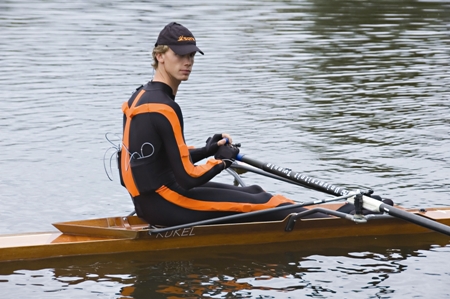Netherlands-based research center, Roessingh Research & Development, a specialist in ambulatory three-dimensional human movement analysis, is utilizing Analog Devices’ iMEMS inertial sensors to enhance the performance and decrease risk of getting injured of competitive rowers.
 Analog Devices' iMEMS inertial sensing technology enables motion capture suit to record physical movement and study rowing kinematics. Credit: Xsens Technologies
Analog Devices' iMEMS inertial sensing technology enables motion capture suit to record physical movement and study rowing kinematics. Credit: Xsens Technologies
The Dutch research center is utilizing the Xsens MVN system devised by the Netherlands-based Xsens Technologies to analyze the kinematics of rowing and the connected implications for rowing competitions. The Xsens MVN system features Analog Devices’ MEMS inertial sensing technology along with sophisticated biomechanical models and sensor fusion algorithms to provide precise three-dimensional motion and kinematic output.
Using MVN, coaches can obtain precise and detailed data about the behavior, timing and motion of each rower or rowing team. Xsens MVN comprises 17 motion trackers having 17 Blackfin digital signal processors and over 80 superior-performance iMEMS inertial sensors of Analog Devices.
Analog Devices’ iMEMS inertial sensors are a combination of its superior-performance signal processing technology and iMEMS sensor designs to offer unprecedented movement sensing performance. During the pilot studies conducted by Roessingh Research & Development, the Xsens MVN system worn by the rowers transferred data through the rowing coach assistant (RCA) software application developed by the Dutch research center utilizing Xsens MVN SDK to reproduce the real-time, three-dimensional motion of the rowers accurately.
RCA’s accurate and comprehensive analysis of rowing cycle data offered the Dutch research center with a clear picture of coordination problems. By utilizing this information, rowing coaches can correct and improve movements and thus decrease the injury risk to the rowers.
Source: http://www.analog.com